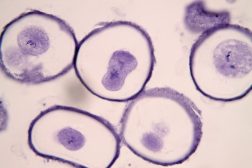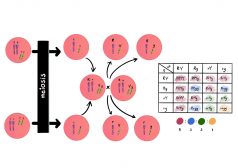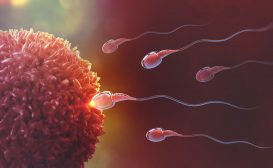Definition
The second of the two consecutive divisions of the nucleus of eukaryotic cell during meiosis, and composed of the following stages: prophase II, metaphase II, anaphase II, and telophase II
Supplement
Meiosis is a specialized form of cell division that ultimately gives rise to non-identical sex cells. There are two successive nuclear divisions: first meiotic division (or meiosis I) and second meiotic division (or meiosis II). Each of them has four major phases: prophase, metaphase, anaphase and telophase, and are also designated as I or II, depending on whether it occurs in meiosis I or meiosis II.
In meiosis I, the homologous chromosomes, each still made up of two sister chromatids, are separated to opposite sides of the dividing cell. These homologous chromosomes though are already genetically diverse from the crossing over (during prophase I). The cell divides into two daughter cells (during telophase I). Each of these daughter cells will enter meiosis II.
During meiosis II, each of the two cells produced from meiosis I divides further into two cells, each containing one of every decoupled chromosome’s sister strands (chromatids), thus, producing four genetically different, haploid cells.
Also called:
- second meiotic division
Compare:
See also:







